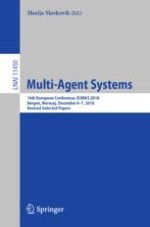2019 | OriginalPaper | Chapter
Learning Hedonic Games via Probabilistic Topic Modeling
Authors : Athina Georgara, Thalia Ntiniakou, Georgios Chalkiadakis
Published in: Multi-Agent Systems
Publisher: Springer International Publishing
Activate our intelligent search to find suitable subject content or patents.
Select sections of text to find matching patents with Artificial Intelligence. powered by
Select sections of text to find additional relevant content using AI-assisted search. powered by
